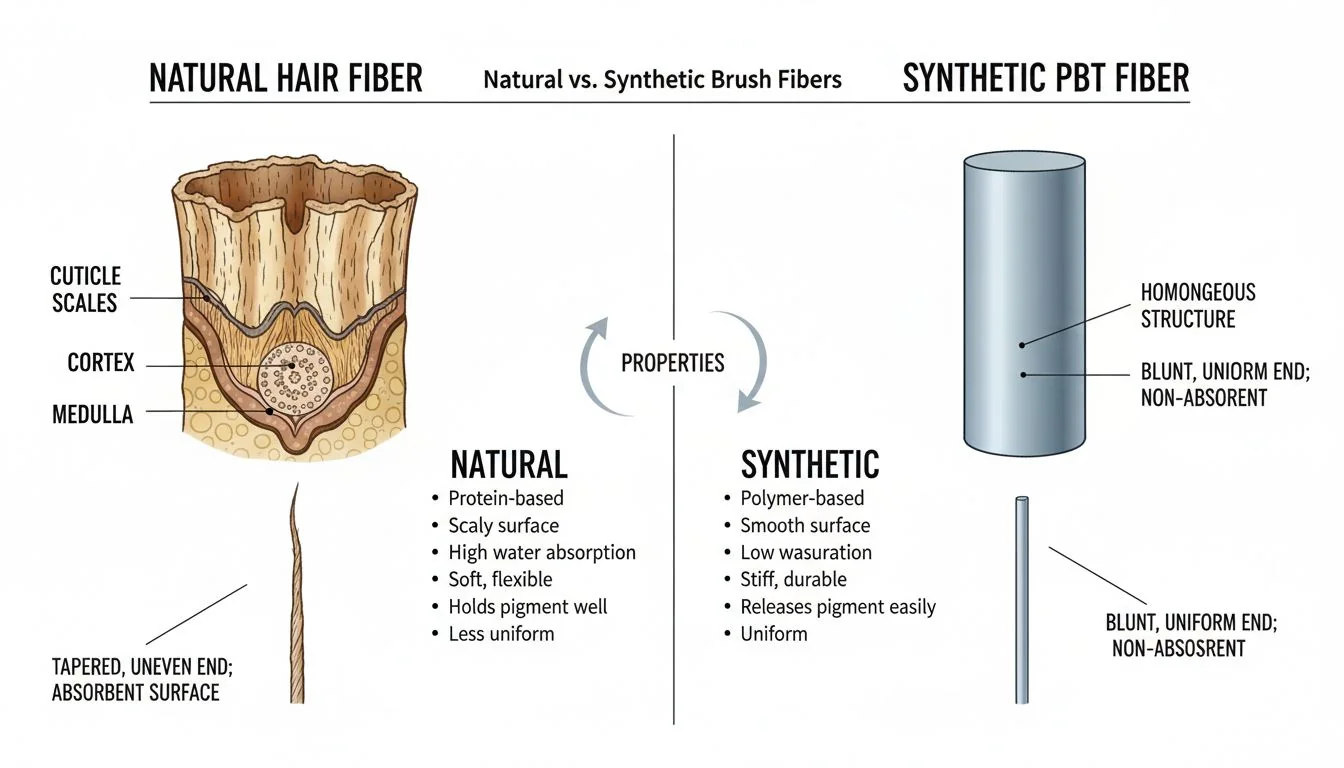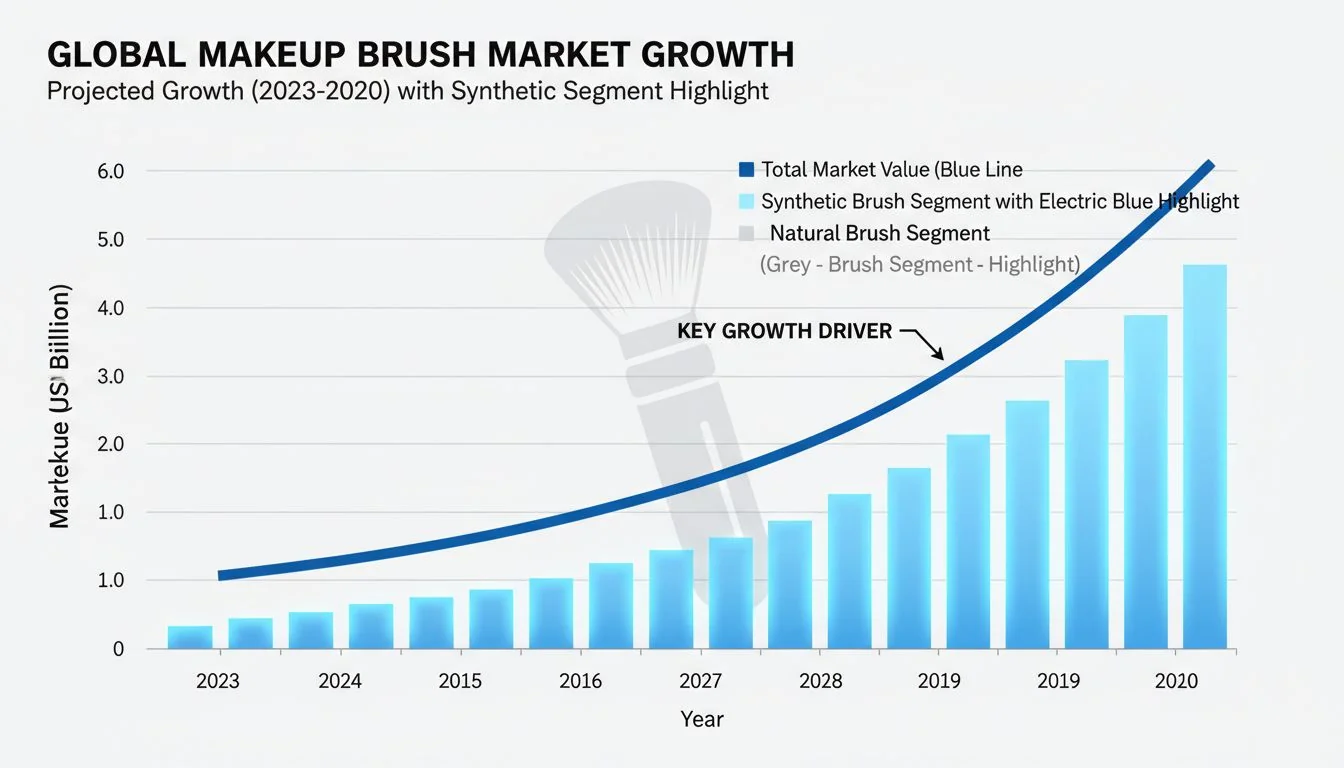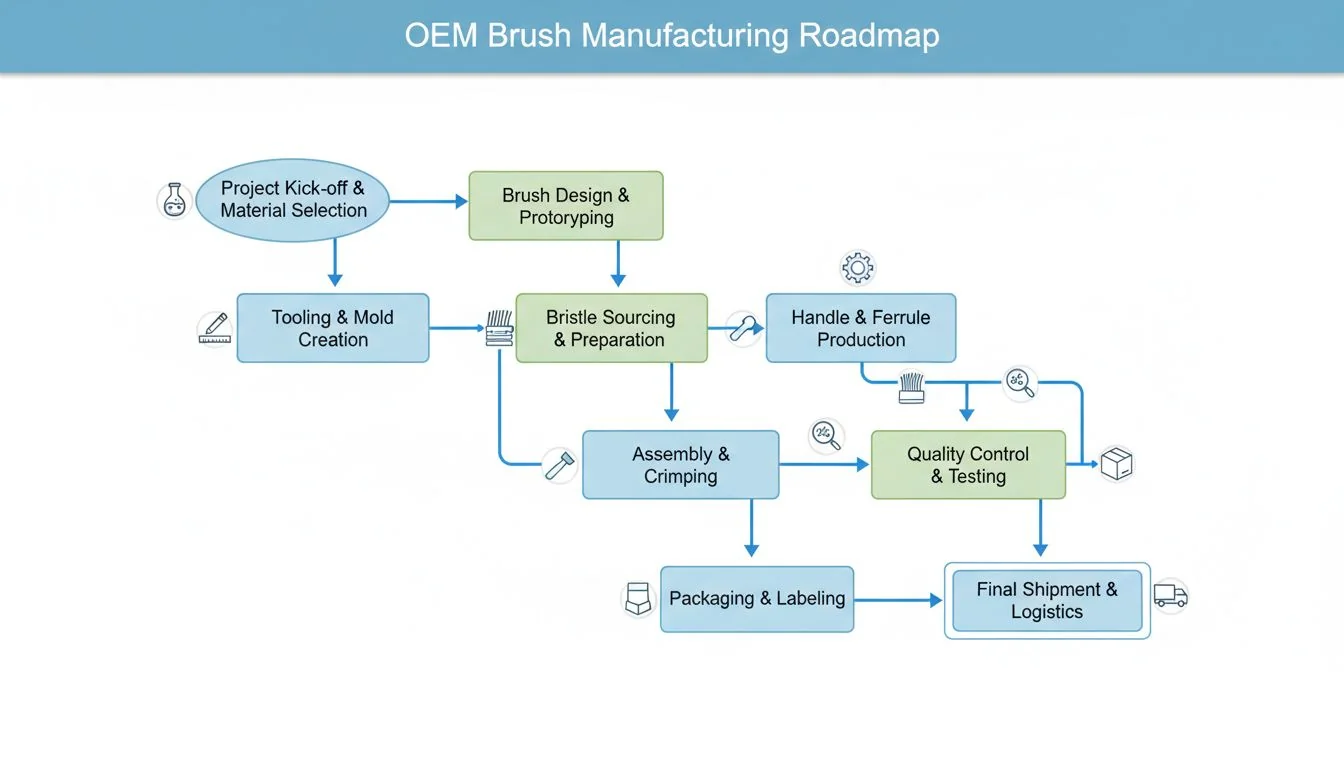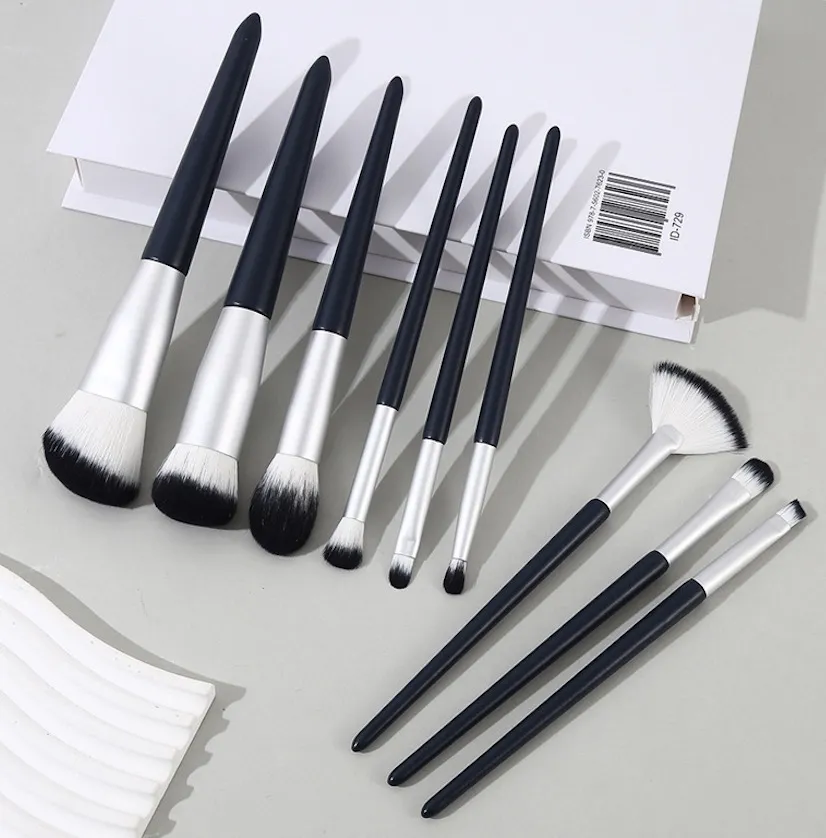Sourcing ethical brushes is confusing and risky. A bad choice can hurt your brand’s reputation and waste thousands. This guide gives you the data to choose the right vegan brushes.
Vegan makeup brushes use high-performance synthetic fibers1 (e.g., PBT/Taklon) instead of animal hair, delivering equal or better softness, pick-up, and hygiene. The global brush market is growing ~6% CAGR, with synthetic leading, and brands choose vegan to meet cruelty-free, sustainable demand.

When I first started working on the factory floor, the best brushes were always made from animal hair. That was the standard. But over the years, I’ve seen a huge shift. Technology has improved so much. Now, the most innovative and high-performing brushes we develop for brands are almost always vegan. The demand from founders like you and your customers is clear. But navigating this new landscape requires more than just a "vegan" label. You need to understand the technical details to create a product that truly stands out. Let’s break down what you need to know to build a successful vegan brush line.
All synthetic makeup brushes are automatically considered 'vegan'.False
While synthetic fibers are not from animals, the manufacturing process, including glues or handle finishes, could involve animal-derived products. True vegan certification covers the entire product.
Modern synthetic brushes can be hypoallergenic and more hygienic than natural hair brushes.True
Synthetic fibers are non-porous, which means they trap fewer bacteria, dead skin cells, and makeup. They are also easier to clean thoroughly, reducing the risk of skin irritation.
What makes a vegan brush “pro-grade” today?
Your customers expect performance, not just a label. Choosing the wrong "vegan" fiber leads to poor application and bad reviews. You must understand the material specs that deliver a professional result.
A pro-grade vegan brush uses advanced synthetic fibers like PBT with specific diameters and treatments. These details define softness, density, and how well the brush works with powders or creams. They can match or even outperform traditional animal hair.

The term "vegan" simply means no animal products were used. But "pro-grade" is all about performance. In my experience, the difference comes down to the science of the fiber.
Fiber Material and Quality
Years ago, most synthetic brushes used nylon. It was cheap but often felt stiff and didn’t pick up powder well. Today, the industry standard is PBT (Polybutylene Terephthalate), often marketed as Taklon. It’s much softer and performs better. For premium lines, I recommend looking at BASF-grade PBT2, which offers superior consistency and softness. Some factories are also developing MCF (Micro Crystal Fibers), which are engineered to mimic the textured surface of animal hair for even better powder pickup and release.
Fiber Specifications by Use Case
The diameter of the fiber is critical. A thinner fiber is softer, while a thicker one is stiffer and provides more density. You need to specify this based on the brush’s job.
| Brush Use Case | Typical Fiber Diameter | Desired Performance |
|---|---|---|
| Eye Blending | 0.05mm – 0.08mm | Ultra-soft, flexible for seamless blending |
| Powder/Blush | 0.07mm – 0.10mm | Soft with good pick-up and diffusion |
| Foundation | 0.08mm – 0.12mm | Dense and firm for buffing liquid/cream |
Treatments and Antimicrobial Options
Fibers can also be treated. Tapering the fiber tips creates a much softer feel. Corrosion treatments can create a textured surface on the fiber to improve how it holds onto powder. For brands focused on hygiene, antimicrobial fibers3 with silver ion or charcoal additives are an option. But if you make this claim, be sure to ask your manufacturer for test reports, like an ISO 22196 certificate, to prove it works.
All PBT/Taklon fibers offer the same level of performance.False
There are different grades of PBT. Premium versions like BASF-grade PBT and specially treated fibers offer significantly better softness, pick-up, and durability.
The diameter of a synthetic fiber directly impacts the brush's softness and density.True
Thinner fibers (e.g., 0.05mm) create a softer, more flexible brush ideal for blending, while thicker fibers (e.g., 0.10mm) create a denser, firmer brush for foundation application.
Is the market ready for a premium vegan brush line?
You have a great idea for a vegan brush line. But you worry if the market is too crowded or if customers will pay a premium. The data shows a clear and growing opportunity for well-positioned brands.
The market is definitely ready. The global makeup brush market is projected to hit nearly $2 billion by 2030, and the synthetic/vegan segment is driving that growth. This trend is powered by a huge consumer shift toward ethical cosmetics.

I talk to brand founders every day who are worried about launching a new product. They ask me, "Cherrie, is there still room for me?" My answer is always yes, especially in the vegan space. The numbers don’t lie.
Market Size and Growth
The data shows a strong, sustained demand. Your brand can be part of this growth story.
| Market Segment | 2021-2024 Value | Projected Value (2030-2032) | CAGR |
|---|---|---|---|
| Global Makeup Brushes | ~$1.47 Billion (2024) | ~$2.0 – $2.6 Billion | ~5.7% – 6.1% |
| Vegan Cosmetics (Overall) | $12.9 Billion (2021) | ~$20.8 Billion (by 2030) | ~6.3% |
Sources: Various market research reports (e.g., Grand View Research, Allied Market Research).
The synthetic brush segment is growing faster than the overall market. This tells us that consumers are actively choosing vegan options.
Growth Hotspots and Pricing
North America is the largest market, but the demand for ethical products is growing fastest in Europe. The Asia-Pacific (APAC) region is also a rapidly emerging market. For a brand like yours, this means you have global potential. You can also position your brand across different price points. There’s the high-volume drugstore level (think Real Techniques) and the premium, pro-grade level where brands can command higher prices with superior materials and design. I advise my clients to lead with synthetic sets online, where ethical messaging converts well, and then pilot premium single brushes to capture higher average selling prices.
The makeup brush market is shrinking due to minimalist beauty trends.False
The global makeup brush market is growing steadily at a CAGR of around 5.7-6.1%, projected to reach approximately $2 billion by 2030.
The growth in the vegan cosmetics market directly supports the business case for launching a vegan brush line.True
The broader vegan cosmetics market is a multi-billion dollar industry with a strong growth rate, indicating a large and engaged customer base actively seeking cruelty-free products, including tools.
What is the OEM roadmap for a certified vegan brush line?
Launching a new brush line from scratch feels complex. One mistake in the OEM process can lead to delays, budget overruns, or a product that can’t be certified. Following a clear roadmap is the key to success.
The roadmap is a step-by-step plan. It starts with selecting certified vegan materials and a certification body like PETA. Then you define all specs, validate claims, and set quality checkpoints with your OEM partner to guide you from concept to shelf.

I’ve helped hundreds of brands navigate this process. The most successful ones are those that are organized and methodical. A good manufacturing partner should make this easy for you, but it helps when you know what to ask for. Here is the roadmap I use with my clients.
The Step-by-Step OEM Plan
-
Material Sourcing & Declaration: Your first step is to get a material declaration from your supplier. This document confirms that no animal hair is used in the bristles and no animal-derived ingredients are in the glue or handle finishes.
-
Certification Selection: Decide early which certification you want. PETA’s Beauty Without Bunnies is widely recognized and has a straightforward application process for brands. Leaping Bunny is often considered stricter as it requires auditing your entire supply chain. Map this out with your factory.
-
Product Specification (The "Spec Sheet"): This is your product’s blueprint.
- Fibers: PBT, BASF-grade PBT, or MCF?
- Diameter & Taper: Specify the exact measurements for each brush.
- Handle: Choose sustainable options like FSC-certified wood4, bamboo, or recycled aluminum.
- Ferrule: Aluminum is standard, but recycled options are available.
-
Packaging & Claims Validation: Select FSC-certified paper for your boxes. If you claim the brushes are antimicrobial, get the ISO 22196 test report5.
-
Sampling & Quality Control: Always get pre-production (PP) samples. This is your final chance to approve everything. Establish clear QC checkpoints for the bulk production run.
-
MOQs & Lead Times: A good partner can offer low MOQs (Minimum Order Quantities) to help you start small. Be clear on lead times for sampling and production to avoid missing your launch dates. This transparency is a major pain point I work to solve for my clients.
Leaping Bunny and PETA certifications are the same.False
While both certify cruelty-free status, Leaping Bunny has a stricter audit process that requires brands to verify their entire supply chain, whereas PETA's certification is often based on brand attestation.
Using sustainable materials like FSC-certified wood and recycled aluminum can strengthen your brand's ethical positioning.True
These material choices provide tangible proof of your commitment to sustainability, which resonates with ethical consumers and supports your cruelty-free messaging.
How can you win the ethical consumer with your vegan brushes?
Just putting a "vegan" sticker on your box is not enough anymore. Today’s consumers are smart and skeptical. If your messaging is weak or you can’t back up your claims, you won’t earn their trust or their money.
You win them over with proof. Align your marketing with real benefits like better hygiene and performance. Display third-party certifications like PETA or Leaping Bunny clearly. Be transparent by sharing fiber specs and test results to build unbreakable brand loyalty.

From my experience helping brands grow, I’ve learned that trust is your most valuable asset. The ethical consumer6 doesn’t just want to buy a product; they want to buy into a brand that shares their values. Here is how you can earn that trust.
Go Beyond "Cruelty-Free" Messaging
Of course, "cruelty-free" is the main point. But vegan brushes have other benefits that appeal to all customers.
- Hygiene: Synthetic fibers are non-porous and easier to clean, making them better for sensitive or acne-prone skin.
- Performance: They shed less than natural hair and work beautifully with liquid and cream products that animal hair can absorb and waste.
- Durability: High-quality synthetic brushes are built to last and maintain their shape after washing.
Show, Don’t Just Tell
Words are cheap. Proof is what converts.
- Display Certifications: Put the PETA, Leaping Bunny, and FSC logos on your packaging and website. These are instant trust signals.
- Publish Your Specs: Be transparent. On your product page, include details about the fiber type (e.g., "BASF-grade PBT"), diameter, and handle materials. This shows confidence and expertise.
- Provide Social Proof: Show that you are in good company. Mentioning that leading brands like KVD Beauty, Urban Decay, EcoTools, and Real Techniques are also fully committed to vegan brushes reduces the perceived risk for a new customer.
By providing this level of detail and proof, you are not just selling a brush. You are building a relationship with your customer based on honesty and shared values.
Marketing a brush as 'vegan' is enough to win over most ethical consumers.False
Savvy consumers look for third-party certifications (like PETA or Leaping Bunny), transparent ingredient lists, and sustainable packaging as proof of a brand's commitment.
Providing detailed cleaning and care instructions for vegan brushes can help reduce customer returns.True
Educating customers on how to properly care for their brushes improves their experience and the product's longevity, leading to higher satisfaction and fewer returns due to perceived quality issues.
Conclusion
The shift to vegan brushes is a massive opportunity. By focusing on high-performance materials, transparent sourcing, and authentic messaging, your brand can meet this growing demand and build a loyal following.
References
-
Understanding high-performance synthetic fibers can help you choose the best vegan brushes for your needs. ↩
-
Discover how BASF-grade PBT enhances brush performance and quality for professional use. ↩
-
Explore the benefits of antimicrobial fibers for hygiene and skin health in makeup application. ↩
-
Learn how FSC certification supports sustainability and ethical sourcing in beauty products. ↩
-
Understanding ISO 22196 can help you verify the effectiveness of antimicrobial claims in brushes. ↩
-
Discover strategies to engage ethical consumers and build brand loyalty in the vegan market. ↩


